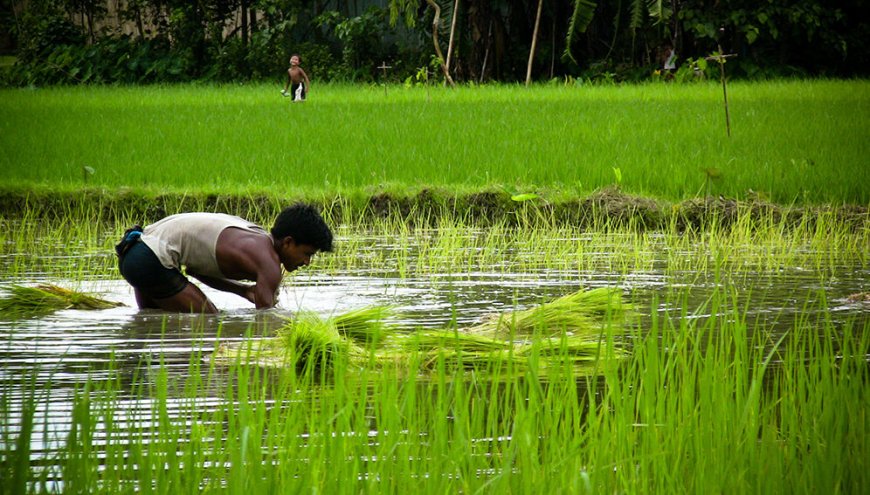Bangladesh's rice production exceeds 40 million tonnes for the first time.
Bangladesh's rice production exceeds 40 million tonnes for the first time.

For the first time, Bangladesh has achieved a rice production of over 40 million tonnes in a fiscal year, driven by rising yields of this staple crop, according to official data.
Local farmers are increasingly adopting high-yielding and hybrid rice varieties, which has led to the country no longer needing to import rice. Estimates from the Bangladesh Bureau of Statistics (BBS) indicate that farmers harvested 40.6 million tonnes of rice in FY 2023-24, reflecting a 4.1 percent increase compared to the previous year—the highest growth in six years.
The most significant yield increase came from Aman paddy, harvested during the previous winter before the Boro paddy in the dry season, with Boro being Bangladesh's primary rice crop. Farmers produced about 21 million tonnes of rice during the Boro harvest in the May-June period earlier this year.
This fiscal year marked the fifth consecutive year of rising rice production, with Wais Kabir, a former executive chairman of the Bangladesh Agricultural Research Council, attributing the increase to improved yields. He noted that farmers are increasingly cultivating modern rice varieties, which have higher yields, and that the land area dedicated to rice has also expanded over time.
Agricultural economist Jahangir Alam mentioned that the increase in rice production has eliminated the need for imports. "We did not need to import any rice in FY24, and this did not significantly impact prices, likely due to sufficient public and private stocks," Kabir added.
According to food ministry data, Bangladesh imported 1.056 million tonnes of rice in FY23, whereas there have been no public or private imports as of October 7 this year.
Kabir pointed out that one reason for the lack of rice imports was an increase in wheat imports. The rising use of wheat by the bakery and food processing industries, as well as for animal feed, has reduced the demand for rice. Wheat imports surged by 71 percent year-on-year, reaching 6.6 million tonnes in FY24.
However, M. Asaduzzman, a professorial fellow at the Bangladesh Institute of Development Studies, expressed skepticism about the rice production estimates. He questioned why prices were rising if the supply was indeed sufficient. "Production has not increased as much as reported. Higher prices suggest a supply shortage," he noted, adding that rice contributes significantly to food inflation, which was notably high in the previous fiscal year.
The BBS reported that food inflation climbed to 10.65 percent in FY24, up from 8.71 percent the previous year. The price of coarse rice, the cheapest variety, rose by 7 percent year-on-year, ranging from Tk 50 to Tk 55 per kilogram in Dhaka yesterday.
Asaduzzman also mentioned that repeated flooding this year has raised concerns about Aman rice cultivation. "If Aman production suffers, we may need to import rice, and we will know more by early November. The government should make decisions regarding imports next month," he stated.
By the end of August, the USDA warned that both Aus and Aman rice acreage and production in Bangladesh might decline due to floods, especially the severe flooding in the eastern regions of the country. Estimates from the Department of Agricultural Extension indicated that Aman acreage dropped to 5.735 million hectares this season from 3.55 million hectares previously.
Agricultural economist Alam estimated that the overall Aman rice output might be between 15.5 and 16 million tonnes this year. "Farmers had to transplant seedlings late because of the floods, which could lead to lower yields," he explained, but added that imports might not be necessary due to favorable grain stocks.
"However, the next Boro rice crop is crucial," he emphasized. "We won't need to worry about food security for this staple grain if we can ensure that production inputs, especially fertilizer, are accessible to farmers."
Kabir warned that ongoing flooding in the Sherpur-Netrokona districts could damage the Aman crop, which cannot be salvaged. "Whether we will need to import rice will depend on the next Aman harvest, and the upcoming Boro output will largely hinge on the government's management of fertilizer."
"The interim government must ensure effective fertilizer management to achieve a good harvest of Boro rice," he concluded.
What's Your Reaction?




















































































